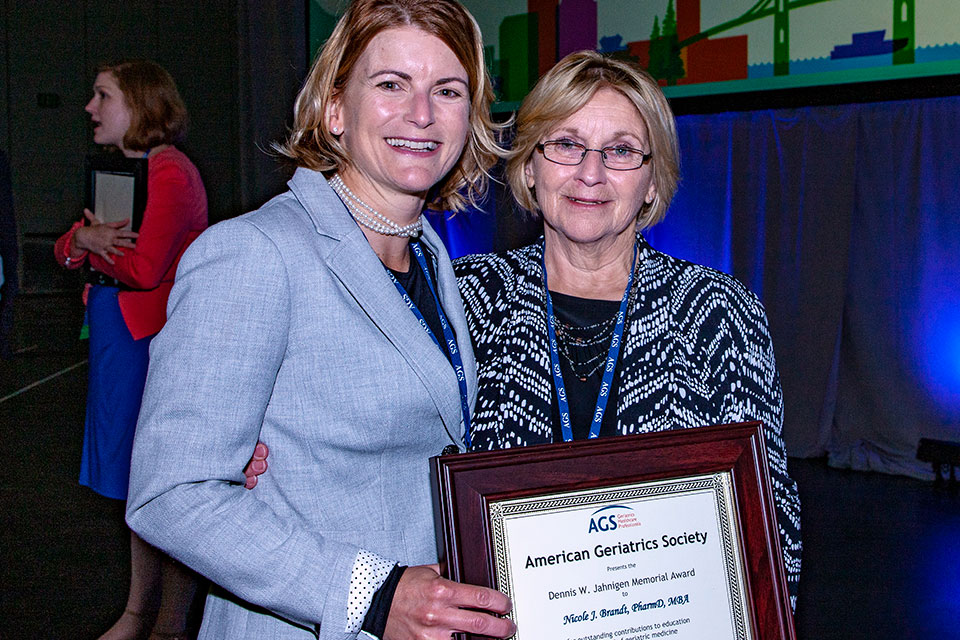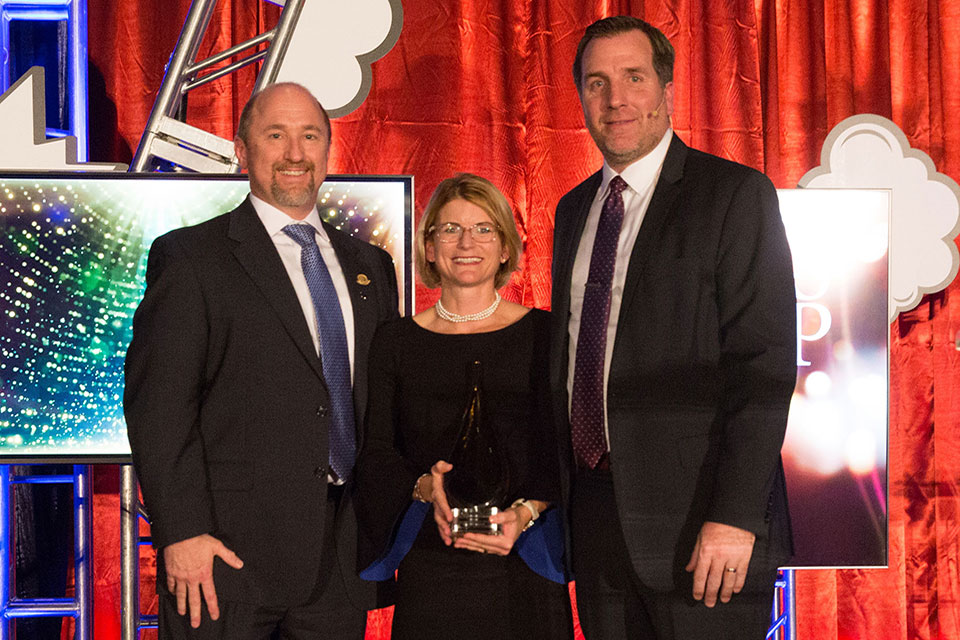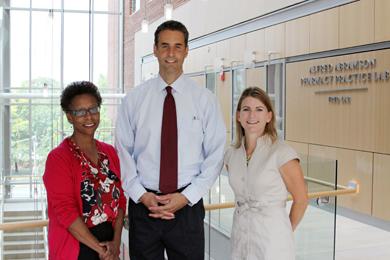Dr. Lucinda Maine Presents APhA-ASP Professionalism Series Lecture at SOP
National expert in pharmacy leadership speaks to students on “The Courage and Consequences of Saying Yes.”
By Malissa Carroll
October 3, 2012
Each year, the American Pharmacists Association Academy of Student Pharmacists (APhA-ASP) at the University of Maryland School of Pharmacy hosts a professionalism series certificate program to help students develop into young professionals through participation in a structured series of events and activities. As part of this program, APhA-ASP hosts a forum each semester at which leaders in pharmacy are invited to speak. The speaker for this semester’s forum was Lucinda Maine, PhD, executive vice president and chief executive officer of the American Association of Colleges of Pharmacy (AACP), who spoke to students about pharmacy leadership, its importance in professional development, and her career pathway.
“Hosting Dr. Maine at our school was such an honor,” says Jamie Elsner, third year student pharmacist and APhA-ASP chapter president. “Her captivating presentation highlighted the importance of being involved as a student and how that involvement can enrich our professional pathways in the future. It was an excellent reminder that what we are doing now really can make a lasting impact.”
Maine is a pharmacy graduate of Auburn University. She received her doctorate at the University of Minnesota. Before accepting her current position at AACP, Maine served as the senior vice president for policy, planning, and communication with the American Pharmacists’ Association (APhA). She has also served on the faculty of the University of Minnesota, where she practiced in the field of geriatrics, and as an associate professor and associate dean at the Samford University School of Pharmacy. She has been active in numerous leadership roles within the profession.
Maine began her presentation with neither a PowerPoint nor a lecture, saying, “I’m going to tell you some stories, and really get into a dialogue about how you maximize this experience that you’ve invested so significantly in to create your future.” She titled her presentation “The Courage and the Consequences of Saying Yes.”
She relayed the story of her own path to leadership, recounting those times she found the courage to say “yes” and how that one word helped transform her life on several occasions.
Nearly 30 years ago, Maine and her four closest friends – all of whom were pharmacy students – set out to change pharmacy as a profession and the roles of pharmacists as members of the health care team. Bound together by a common passion for the future of their profession, Lucinda Maine, Stephanie Phelps, Debbie Simonson, Donna Walker, and Cindy Iannarelli, who passed away in 2010, called themselves the Future Five.
“We had listened to the leaders in pharmacy talk about how the profession needed to change. Pharmacists needed to get out from behind the counter. They needed to counsel their patients. They needed to provide care, and that sounded pretty exciting to us,” said Maine. “The five of us decided that we were going to go out and we were going to radically change the profession of pharmacy. We knew that through unified activity at the national level, the state level, and the local level, pharmacists could very much make a difference in the lives of patients.”
It was in her personal pursuit to further her contribution to the pharmacy profession that Maine encountered a distinguished professor from the University of Maryland, Dr. Peter Lamy.
After completing her Bachelor’s Degree, Maine enrolled in a pharmaceutical clinical sciences graduate program focused on improving health outcomes. She wanted to focus on medication use in the elderly as her contribution, and attended an APhA meeting at which Dr. Lamy and another long-term care pharmacist were speaking.
At the time, there were more than 4,000 published articles that addressed medication use in the elderly. Reviewing all of those articles as part of a doctoral dissertation would prove a daunting task for any graduate student, so Maine mustered up the courage to first ask, not Dr. Lamy, but the other professional for assistance on where to begin. His advice, “Well, you just do it,” was less than helpful to an already overwhelmed graduate student. She then found the courage to approach Dr. Lamy.
“He [Dr. Lamy] looked at me and he looked at my name tag and he said, ‘Lucinda, you can’t do it. There’s just too much literature. So, what I recommend that you do, is narrowly define the question you want to answer and build your literature search around that,’” recalls Maine. “I resisted the temptation to hug him. He knew that I was a young, interested geriatric scholar, and he wanted to help.”
To conclude her presentation, Maine also shared with students a personal health story that occurred eight years ago when she received her diagnosis of stage zero breast cancer. She contrasted her interaction with the surgeon who performed the initial biopsy – an individual who used crude analogies to describe her condition and level of risk – with that of the oncologist she met with following the surgery, who asked her one simple question — “Tell me what you know about your condition and its treatment” — and tailored her explanation to Maine’s knowledge level based on the response Maine provided.
“I love to share that story with people who are learning to be patient-centered health care providers because it’s such a stark contrast in a clinician’s thinking about how to interact with a person they have never met before,” says Maine. “You never know what the ability or the level of fear and anxiety of the person that you’re serving at that minute might be.”
During the question and answer session that followed her presentation, Maine fielded questions from students at both the Baltimore and Shady Grove campuses. Questions asked addressed a wide range of topics, including how students can acquire mentors and the struggles she encountered while trying to establish herself in the pharmacy profession.
“You could waste four years here pretty quickly by just focusing on the tough academics. Take advantage — locally, regionally, and nationally — of the opportunity to learn more about your profession,” said Maine. “There’s so much to be gained from the people you meet, the leaders you hear from and know, and the programs that you digest as a consumer of some of our profession’s opportunities for active involvement.”



